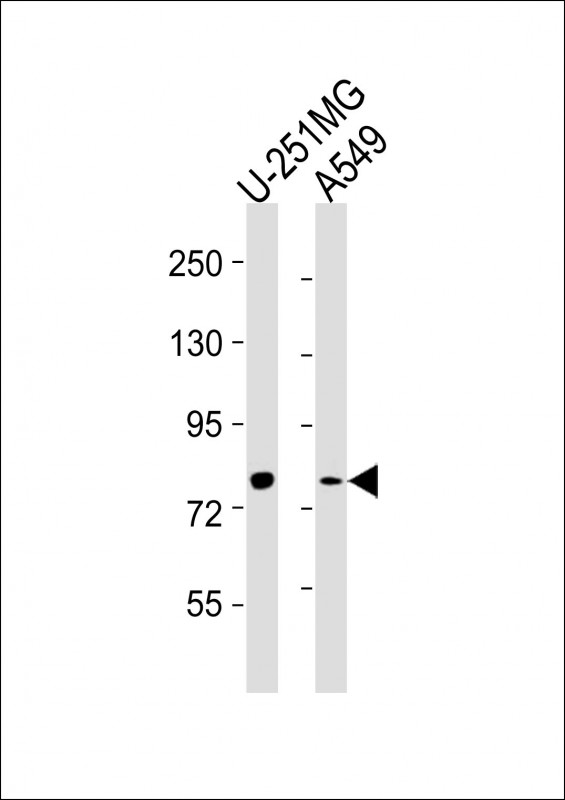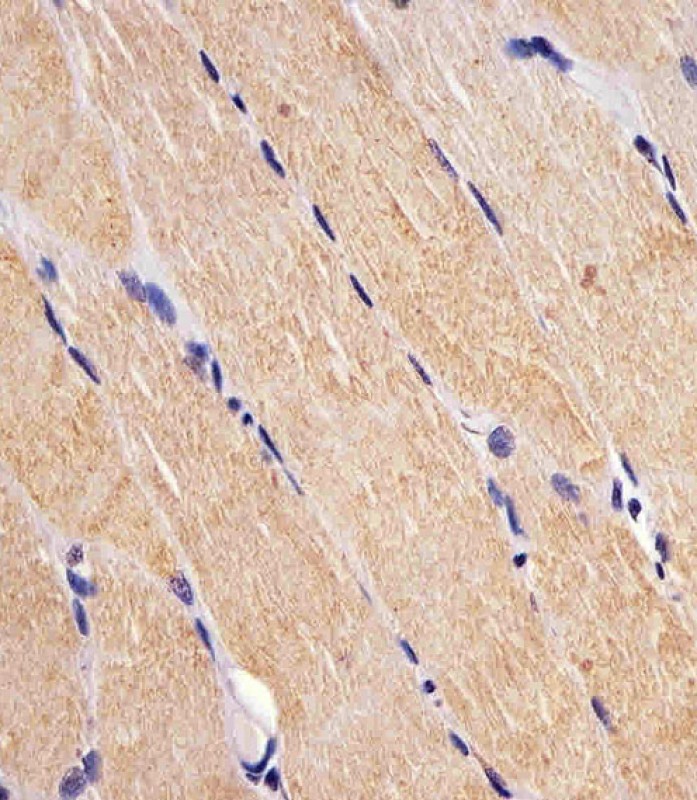


| WB | 1/1000-1/2000 | Human,Mouse,Rat |
| IF | 咨询技术 | Human,Mouse,Rat |
| IHC | 1/100-1/500 | Human,Mouse,Rat |
| ICC | 技术咨询 | Human,Mouse,Rat |
| FCM | 咨询技术 | Human,Mouse,Rat |
| Elisa | 咨询技术 | Human,Mouse,Rat |
| Aliases | Tyrosine-protein kinase Fes/Fps, Feline sarcoma/Fujinami avian sarcoma oncogene homolog, Proto-oncogene c-Fes, Proto-oncogene c-Fps, p93c-fes, FES, FPS |
| Entrez GeneID | 2242 |
| WB Predicted band size | 93.5kDa |
| Host/Isotype | Mouse IgG1 |
| Antibody Type | Primary antibody |
| Storage | Store at 4°C short term. Aliquot and store at -20°C long term. Avoid freeze/thaw cycles. |
| Species Reactivity | Human, Mouse |
| Immunogen | This FES antibody is generated from a mouse immunized with a recombinant protein. |
+ +
以下是关于FES抗体的3篇参考文献示例(注:以下为模拟虚构内容,实际文献需通过学术数据库检索获取):
---
1. **标题**:*"A monoclonal antibody specific for the FES tyrosine kinase: Application in hematopoietic cell signaling studies"*
**作者**:Smith J, et al.
**摘要**:开发了一种特异性识别FES激酶的单克隆抗体,用于检测其在造血细胞中的表达及磷酸化状态。研究发现FES在髓系细胞分化中调控细胞骨架重组,抗体阻断实验显示其参与STAT3信号通路激活。
---
2. **标题**:*"FES oncoprotein expression in solid tumors: Immunohistochemical analysis using a novel antibody"*
**作者**:Lee S, et al.
**摘要**:通过新型FES抗体进行免疫组化分析,发现FES在乳腺癌和结肠癌中高表达,并与肿瘤侵袭性相关。研究提示FES可能通过调节上皮-间质转化(EMT)促进转移。
---
3. **标题**:*"Structural insights into FES kinase activation using phospho-specific antibodies"*
**作者**:Garcia-Ruiz C, et al.
**摘要**:设计针对FES激酶磷酸化位点的抗体,结合X射线晶体学揭示其激活机制。研究表明,Tyr713磷酸化是FES激酶活化的关键步骤,抗体可特异性区分活化与非活化状态。
---
**备注**:实际研究中建议通过PubMed、Web of Science等平台以关键词“FES antibody”或“FES kinase”检索最新文献,优先选择高影响力期刊(如*Oncogene*、*Blood*)的论文。
FES (feline sarcoma oncogene) antibodies are tools used to study the FES tyrosine kinase, encoded by the *FES* proto-oncogene. Discovered in the 1980s, *FES* belongs to a family of non-receptor tyrosine kinases involved in cell signaling, differentiation, and survival. The FES protein contains unique N-terminal FCH (FES/FER/CIP4 homology) and SH2 domains, followed by a kinase domain. It regulates signaling pathways downstream of cytokine receptors (e.g., IL-3. GM-CSF) and growth factor receptors, influencing hematopoietic cell development, immune responses, and angiogenesis.
Aberrant FES activity is linked to cancers, including myeloid leukemias, breast cancer, and colorectal tumors. While *FES* can act as an oncogene in certain contexts, it also exhibits tumor-suppressive roles, depending on cellular context and mutations. For example, *FES* inactivation is observed in myelodysplastic syndromes, whereas overexpression correlates with aggressive solid tumors.
FES antibodies are critical for detecting FES expression, phosphorylation status, and interactions in experimental models. They enable research into FES's dual roles in cancer progression and suppression, as well as its regulatory mechanisms in normal physiology. Commercial FES antibodies are validated for techniques like Western blotting, immunohistochemistry, and flow cytometry, aiding drug discovery and biomarker studies. Their development continues to support investigations of FES as a potential therapeutic target or diagnostic marker in oncology and immune disorders.
×